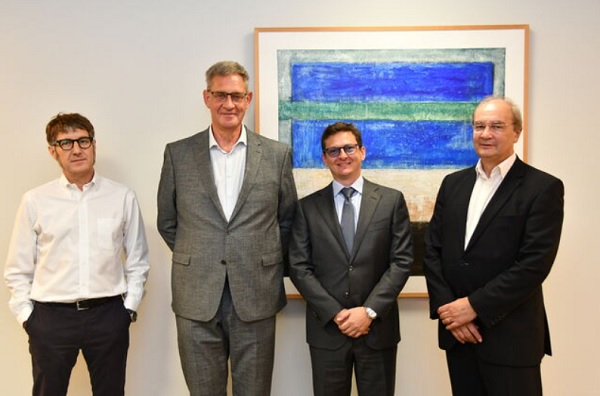 L-R: Marco Chini, Dirk Fransaer, Thomas Friederich, Lucien Hoffmann;
Credit: LIST
L-R: Marco Chini, Dirk Fransaer, Thomas Friederich, Lucien Hoffmann;
Credit: LIST
The Luxembourg Institute of Science and Technology (LIST) has confirmed that it has signed a memorandum of understanding with EARTHLAB Luxembourg, a subsidiary of Telespazio (a 67/33 Leonardo and Thales joint venture), active in the creation of innovative solutions combining big-data technologies, Artificial Intelligence and remote sensing.
The two parties aim to strengthen their collaboration in the field of Geo-Information-based applications, with common objectives to particularly:
• Promote innovations and create greater value for national and European research, market competitiveness, and society.
• Foster and support the development of joint research projects or activities based on common interests and complementarity, and apply for national and/or international funding, when possible, in order to support the joint projects.
• Demonstrate innovative technologies and business or market models and foster the level of innovation and science-based progression to strengthen both party’s position in the research and innovation landscape in Luxembourg and Europe.
"This new partnership is fully aligned with our ambition to become a reference in research and innovation in the domain of integrated space applications, combining Earth observation and telecommunication. The collaboration with EARTHLAB Luxembourg will allow us to bring to the market innovative solutions based on space technologies and artificial intelligence," emphasised Lucien Hoffmann, director of the Environmental Research and Innovation department of LIST.
Thomas Friederich, General Manager of EARTHLAB Luxembourg, stated: "Our partnership with LIST is a pivotal step in our pursuit of innovation and excellence in the realm of space applications. This collaboration reinforces our commitment towards creating cutting-edge solutions, integrating earth observation data with innovative techniques like Deep Learning and Computer Vision. Our goal is to assist professionals in managing multiple hazards in a more efficient and proactive manner, leveraging the latest technological and scientific advancements. This collaboration underscores our vision of a modular and data-centric approach to managing risks and challenges, transcending geographical and sectoral boundaries."








